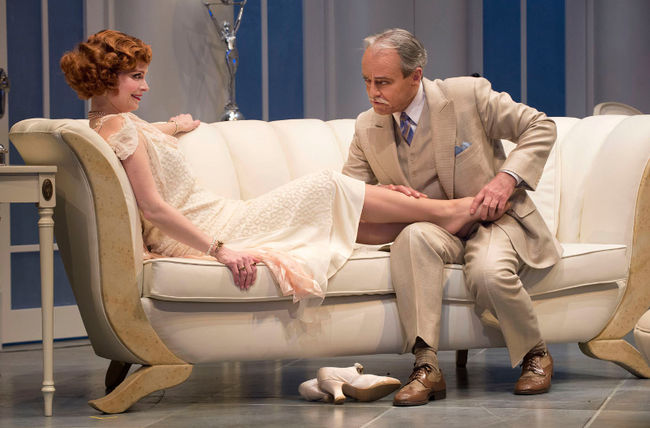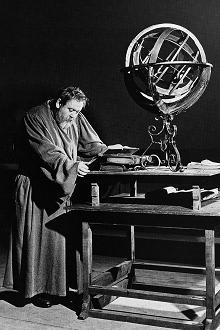“Were it not for their work, comparatively few of us would be able to enjoy the plays of Chekhov, Ibsen or Molière. They are our lifelines to the wider world of theater. Yet literary translators are the perpetually unsung heroes and heroines of literature. If you doubt it, try naming a half-dozen of them off the top of your head…”
Archives for August 16, 2013
TT: Cash and carry
In today’s Wall Street Journal I report on my recent visit to Ontario’s Shaw Festival, where I saw three superb revivals, Our Betters, Faith Healer, and Major Barbara. Here’s an excerpt.
* * *
It isn’t quite right to say that Somerset Maugham’s plays are forgotten, but it’s close enough to pass for true, at least in America, where the celebrated author of “Cakes and Ale” and “The Razor’s Edge” is now known almost exclusively as a novelist and short-story writer. Yet there was a time when he was also one of the English-speaking world’s most popular playwrights, and I’ve never seen a Maugham revival (there are such things) without asking myself why adventurous directors aren’t willing to take a second look at his stage works. So the Shaw Festival deserves a wealth of plaudits for mounting “Our Betters,” Maugham’s 1915 comedy about a group of monied American expatriates who’ve come to England in order to marry titled, cash-strapped Brits. Moreover, they’ve done it so well that you’ll be at a loss to explain why so crackling a satire hasn’t been seen on Broadway since 1928.
 Maugham was an unabashed cynic, and the immediate appeal of “Our Betters” arises from the savagery with which its well-bred characters skewer the foibles of their friends (“If one wants to be a success in London one must either have looks, wit or a bank balance”). What makes it more than just a school-of-Wilde stage soufflé is his willingness to raise the dramatic stakes in the second act and let the same characters admit to the frustrated passions that they more often prefer to conceal with deceptively brittle badinage.
Maugham was an unabashed cynic, and the immediate appeal of “Our Betters” arises from the savagery with which its well-bred characters skewer the foibles of their friends (“If one wants to be a success in London one must either have looks, wit or a bank balance”). What makes it more than just a school-of-Wilde stage soufflé is his willingness to raise the dramatic stakes in the second act and let the same characters admit to the frustrated passions that they more often prefer to conceal with deceptively brittle badinage.
This production, like the Shaw’s similarly rare and equally important 2012 revival of Terence Rattigan’s “French Without Tears,” is as good as it could possibly be. Morris Panych has staged it briskly and with just the right lightness of touch….
The most agreeable of the Shaw Festival’s four performance spaces is the Royal George Theatre, a vaudeville house that has been transformed into a small but beautifully proportioned 328-seat proscenium-stage theater. In addition to “Our Betters,” the festival is presenting two other plays at the Royal George, Brian Friel’s “Faith Healer” (directed by Craig Hall) and Bernard Shaw’s “Major Barbara” (directed by Jackie Maxwell, the festival’s artistic director). Both are staged and acted with unusual sensitivity.
Anyone fortunate enough to have seen the 2006 New York revival of Mr. Friel’s great play, in which Ralph Fiennes was cast as a drunken faith healer who is forced by chance–or fate–to face his deepest doubts, will be staggered by Jim Mezon’s identically penetrating performance in the same role. Suffice it to say that lightning can strike the same tree twice. As for Benedict Campbell, who plays the seductively urbane arms manufacturer in “Major Barbara,” he sails through that demanding part with the kind of virtuosity that you’d expect from a top-dollar Broadway star turn….
* * *
Read the whole thing here.
A clip from George Cukor’s rarely seen 1933 film version of Our Betters:
TT: From another tongue
In today’s Wall Street Journal “Sightings” column I discuss the complex problem of translating foreign-language plays into English. Here’s an excerpt.
* * *
Whether they know it or not, most American playgoers owe an incalculably great debt to translators. Were it not for their work, comparatively few of us would be able to enjoy the plays of Chekhov, Ibsen or Molière. They are our lifelines to the wider world of theater. Yet literary translators are the perpetually unsung heroes and heroines of literature. (If you doubt it, try naming a half-dozen of them off the top of your head.) Their indispensable efforts are scarcely ever mentioned in theater reviews save in passing, even though it is in their voices that the vast majority of English-speaking critics, myself included, hear such supreme masterpieces of the playwright’s art as “The Cherry Orchard,” “Hedda Gabler” and “The Misanthrope.”
Yes, translation is by definition an inadequate substitute for being able to read a masterpiece in the original. As Robert Frost famously said, “Poetry is what gets lost in translation.” But it’s vastly better than nothing, and sometimes it’s so much better that a first-rate performance of a well-translated play is not a poor makeshift but a profoundly satisfying experience in its own right.
I suspect that most playgoers don’t understand how inexact a science literary translation is. Even the simplest of lines may lend itself to multiple renderings. Take, for instance, Masha’s oft-quoted first line in Chekhov’s “The Seagull.” When Medvedenko asks her why she always wears black, she replies, “I’m in mourning for my life. I’m unhappy.” That, at any rate, is the way the line is translated by Milton Ehre, Michael Frayn, Stephen Mulrine, Tom Stoppard, Jean-Claude van Itallie, Laurence Senelick and Christopher Hampton. But Marian Fell, who prepared the first published English-language version of “The Seagull” in 1912, translated it this way: “I dress in black to match my life. I am unhappy.” It was Constance Garnett who in 1923 came up with something close to our modern version…
 These distinctions may seem trivial on the page, but they make a huge difference on the stage, where every consonant counts. Moreover, exactitude is not the same thing as stageworthiness. An effective translation of a play must be speakable. Accurate or not, it’ll feel flat in performance if it doesn’t give an actor something solid to wrap his tongue around.
These distinctions may seem trivial on the page, but they make a huge difference on the stage, where every consonant counts. Moreover, exactitude is not the same thing as stageworthiness. An effective translation of a play must be speakable. Accurate or not, it’ll feel flat in performance if it doesn’t give an actor something solid to wrap his tongue around.
That’s why some of the best translations have been the work of experienced actors. The most spectacular example is Charles Laughton’s English-language version of Bertolt Brecht’s “Life of Galileo,” which he prepared in close collaboration with the author, after which he performed the play in Los Angeles and New York in 1947. Laughton’s version isn’t always precisely faithful to the original, but when I saw it performed last year by New York’s Classic Stage Company, I was amazed to discover how much more theatrical it was than the now-standard translation of David Edgar….
* * *
Read the whole thing here.
TT: Almanac
“We do not live for idle amusement. I would not run round a corner to see the world blow up.”
Henry David Thoreau, “Life Without Principle”
